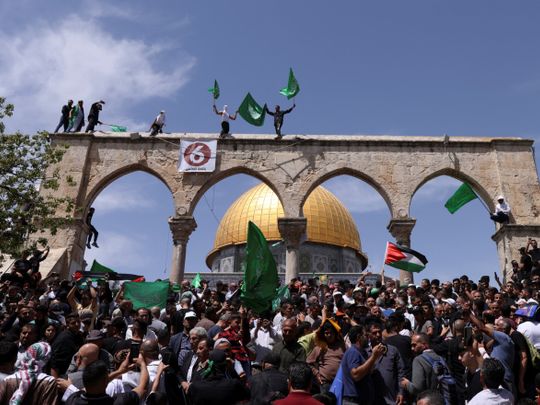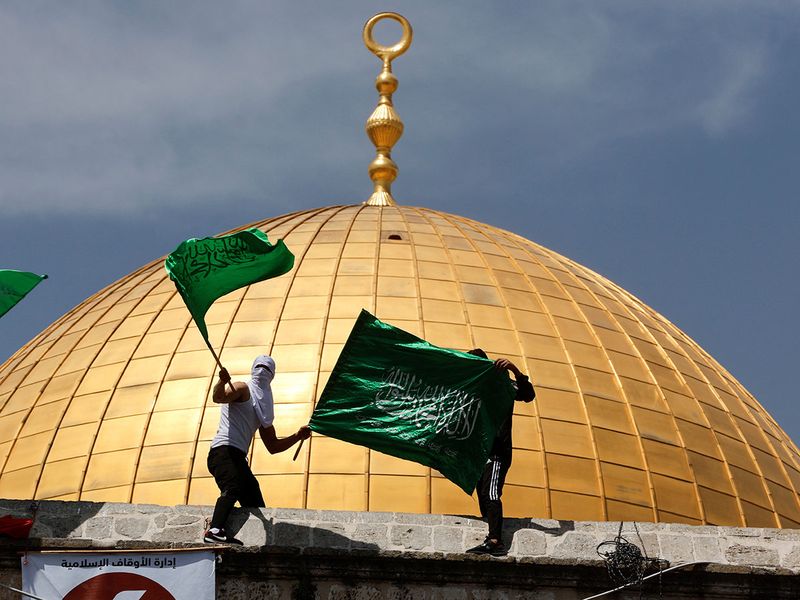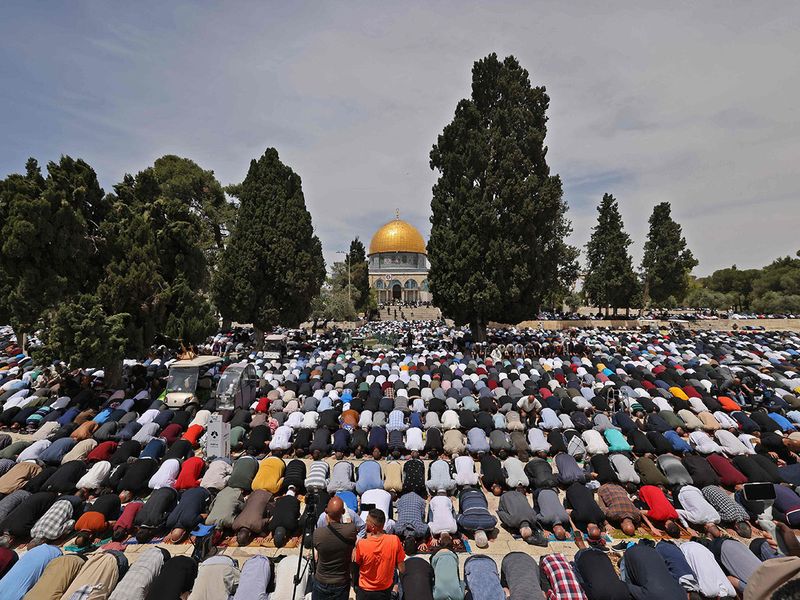
JERUSALEM: Standing in front of his shop on one of the main arteries through Jerusalem’s Old City, Palestinian grocer Alaa Zorba has a shouting match with an Israeli policeman.
This time around, the argument is brief and doesn’t spill over into violence.
But with tensions at boiling point just a few hundred metres (yards) from some of the holiest sites in Islam and Judaism, such incidents can quickly degenerate.
“They put oil on the fire,” Zorba said afterwards, as he moved stocks into his shop under the watchful eyes of three Israeli officers.
Zorba’s shop sits on the main route for Palestinian Muslims heading to pray at the Al Aqsa Mosque compound, a key holy site in both Islam and Judaism and often the focal point of Israeli-Palestinian violence.
“We are deeply concerned by the escalating violence in the occupied Palestinian territory and Israel over the past month,” said Ravina Shamdasani, spokeswoman for the UN Office of the High Commissioner for Human Rights.
“The use of force by Israeli police resulting in widespread injuries among worshippers and staff in and around the Al Aqsa mosque compound must be promptly, impartially, independently and transparently investigated,” she said.
“Those responsible for any violations should be held to account, and policies and procedures on the use of force reviewed with a view to avoid any further violations.”
She said the conduct of Israeli security forces on April 15, captured in numerous videos, “raises serious concerns that the use of force was widespread, unnecessary and indiscriminate”, Shamdasani added.
Noting how the tension in Jerusalem had impacted on other areas, the spokeswoman said Israel’s intensified military operations in the West Bank, especially in Jenin, and the use of firearms by Palestinian militants, “place Palestinian residents at high risk”.
She said the weeks of violence included “the most serious attacks in Israel in many years”, with 12 Israelis and two foreign nationals “killed by attackers in incidents in Beersheba, Bnei Brak, Hadera and Tel Aviv”.
She said Israel’s raids and arrest operations across the West Bank raised serious concerns of “excessive use of force and ill-treatment and arbitrary arrests of family members of wanted people”.
“Some of the killings, including in particular Israeli security forces shooting at a Palestinian woman in Husan on April 10, raise serious concerns of excessive use of force and arbitrary deprivation of life,” she said.
“All use of force resulting in killing or injury must be promptly, impartially, independently and transparently investigated, and those responsible for any violations held to account.”
Furthermore, she said the Israeli authorities’ response to attacks in Israel, such as movement restrictions, raised concerns about possible collective punishment.
International humanitarian and human rights law strictly prohibits penalties against people or groups for acts they have not personally committed, said Shamdasani.
She said the office of UN human rights chief Michelle Bachelet was calling for calm and urged investigations where people had been killed or injured.
A few minutes earlier, 45-year-old Zorba had seen an officer check the papers of a Palestinian wanting to go and pray there - only to turn him back without any apparent reason and instruct him to try at another gate.
Shortly afterwards, the same officer warmly wished a passing Jew “happy Passover”.
Sensing a double standard, Zorba saw red.
“I told them you’re not normal people,” said Zorba.
That sparked a loud argument. But despite exchanges of angry words, it did not turn physical, and soon both sides went back to their own business.
But Zorba is troubled by the situation.
“Day after day the tension is stronger,” he said.

Minutes later, two Israeli policemen walk past, flanking a young Palestinian man in handcuffs.
The sight is so common these days that nobody pays them any attention.
The Old City of Jerusalem, with its Jewish, Muslim, Christian and Armenian quarters, swarms with tourists and pilgrims, security forces, merchants and its residents who live in a constant state of tension.
Both Muslim and Christian Palestinians as well as rights groups accuse Israeli ultra-nationalist groups of trying to “Judaise” the district, which lies in the Israel-annexed eastern sector of Jerusalem.
And in what Palestinians see as a blatant provocation, Jewish hardliners have been stepping up visits to the esplanade.
By long-standing tradition, Jews may visit but not pray at the site, seen in Judaism as the holiest place in the world.
Their repeated visits, as Jewish Passover clashes with Ramadan, have been blamed for sparking protests followed by police crackdowns that have wounded more than 200 Palestinians in the past week.
This week, more than 3,800 Jews made pilgrimages to the site, according to the group that organises the tours, a record for the Passover period.
Fresh clashes
Early on Friday morning, Palestinian youths once again clashed with Israeli forces.
“The situation is very difficult in Jerusalem. The mood right now is like we’re at war,” said Firas Mohamad.
He runs a spice shop near a major entrance to the Al Aqsa compound and the main route to the Al Buraq Wall (Western Wall), the holiest place where Jews are allowed to pray.
He blames the tensions on groups of Jewish pilgrims who frequently pass his shop, accompanied by security guards.
“The come in groups, with flags, and chant ‘Death to Arabs, death to Muslims’, and dance in the street. This makes problems,” he said.
“The police does nothing, they just look after them. If I say a word, the police comes to me. So we can’t say or do anything.”

As they leave the site, some Jewish worshippers sing religious songs or prostrate themselves, kissing the stones.
For Palestinian Muslims, these visits are seen as provocations.
Ultra-Orthodox Jews see it differently.
One worshipper, with a prayer shawl under his arm walked quickly past a group of police.
He wished them “Happy Passover - and thank you.”
Asked why, he said: “Because they are our guardians, they are protecting us. We wouldn’t be able to walk here that easily if they weren’t here.”
But Palestinian Nader Zaro, who runs a nearly empty cafe on the nearby Via Dolorosa, voiced worries about the future.
“They keep going and going, and one day, it’s going to explode in a big war,” he said.












